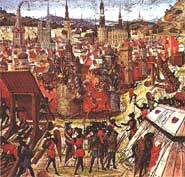The four-year project on Robert the Monk’s History of the First Crusade will be lead by Dr Marcus Bull of the University’s School of Humanities.
When the First Crusade captured Jerusalem in 1099 after an epic and odds-defying three-year journey, the news triggered a huge surge of interest back in western Europe. Of the many histories of the First Crusade that were written to feed that interest, none was as popular and as widely read as Robert the Monk’s History, which became a true ‘best-seller’.
Robert did not go on the crusade at all. He was an armchair historian writing in the relative comfort of a monastery in northern France. But he succeeded in capturing the spirit of the expedition in a lively and engaging Latin style, vividly conveying the crusaders’ extraordinary hardships and unlikely triumphs.
Robert’s History survives in about 95 manuscripts in archives and libraries dotted around Europe, from Russia to Spain. A researcher attached to the project will travel to all these places and examine the manuscripts, the eventual aim being to produce a printed edition of the text for scholars and students to use. There will also be a major international conference on crusade history as part of the project and a PhD student will conduct parallel research into another chronicle of the First Crusade that was written at the same time as Robert’s.
Dr Bull said: “Robert the Monk’s History has long been the ‘holy grail’ of research on the First Crusade. The sheer number of manuscripts in so many countries has always deterred scholars from attempting a detailed study but the AHRC award means that this will now be remedied.
“The crusades continue to have a powerful modern resonance, and the word is often bandied around in discussion of contemporary conflicts around the world, so it is important to develop a clear understanding of the crusade movement in its true historical context.”
Arts and Humanities Research Council: Each year the AHRC provides approximately £90 million to support research and postgraduate study in the arts and humanities, from archaeology and English literature to design and dance. In any one year, the AHRC makes approximately 700 research awards and around 1,500 postgraduate awards. Awards are made after a rigorous peer review process, to ensure that only applications of the highest quality are funded. Arts and humanities researchers constitute nearly a quarter of all research-active staff in the higher education sector. The quality and range of research supported not only provides social and cultural benefits but also contributes to the economic success of the UK.
